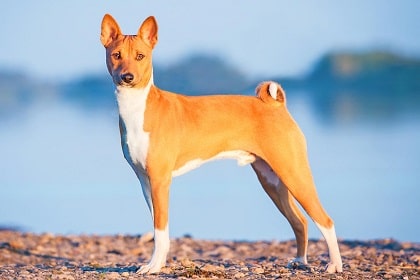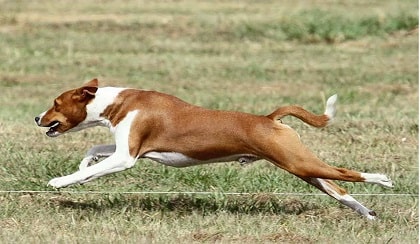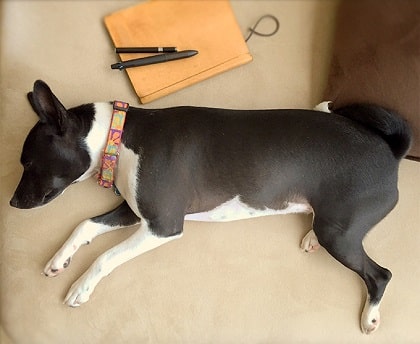The barkless dog from Africa, popularly known as the Basenji is a hunting dog. He is short, has a fine short coat, muscular body and erect ears. The dog constantly has a mischievous expression on his face due to the wrinkled brow.
Basenji Dog Breed Overview

| Group: | Hound group |
| Size: | Small-Medium (22-24 pounds) |
| Lifespan: | 13-14 years |
| Best Suited For: | Families |
| Temperament: | Independent, Intelligent, Lively |
| Exercise Needs: | Moderate |
| Drooling Potential: | High |
| Grooming Needs: | Low |
| Similar Breeds: | Borzoi, Harrier |
1. Basic Features

The Basenji has an unusually shaped larynx due to which he produces an unusual sound. This gives him the name of the barkless dog. He is described as a catlike dog for his curious and independent disposition. The Basenji is highly curious and intelligent. But he is also very mischievous and destructive. The dog is energetic and has a mind of his own.
Basenji has a tightly curled tail and a glistening short coat. They are usually found in tan, brown or black colors.
2. Basenji Origin
The Basenji is said to have been existed for over a century. The Basenjis are said to be one of the oldest breeds. These dogs originated in Africa and basenji like dogs were depicted in paintings which dated back to the Twelfth Dynasty of Egypt.
They were brought from the interior Africa as gifts for the pharaohs.
They were originally used for hunting. These dogs were famous for their intelligence, courage, and speed. In the 1930s, the first Basenji was imported to England and the United States.
Traces of the Basenji is also seen in ancient Babylonian and Mesopotamian art.
3. The Personality of Basenji Dogs
A Basenji, no doubt, is intelligent and very independent. He is a hound and will chase whatever comes his way. He runs after smaller animals all the time. They are very endearing and clever. Basenjis are mischievous and might become destructive. However, they are excellent watchdogs. They are highly alert but not great at barking at intruders.
He might not bark a lot but will yowl and scream. So, we may not see him as much of a barker but a Basenji will make plenty of other noises to make up for it. We cannot really say that he is a silent dog.
4. Basenji Behavior
The Basenji is playful yet very gentle.
He likes exploring and might not listen to you while he’s on his hunt.
They are affectionate dogs as well and will demand a little attention themselves every now and then. He is not much of a fetcher but a chaser. The Basenji will chase outdoor cats and other small animals whenever given a chance due to his strong prey drive.
He may be a little reserved with strangers but will become very attached to his owner. They become very emotionally attached to a single person. They are climbers and will easily get over chain fences.
5. Exercise Requirements

The Basenji needs daily exercise. It could be in the form of a daily walk or some other exercise. As they are great climbers and escape artists, it might not be a very good idea to leave him unattended. A good walk and a few play sessions will just do well if you decide to keep him in an apartment living.
A Basenji should always be kept on a leash or a securely fenced area. Also, be very careful about which type of fence you are using. They could easily climb on the chain like fences using them as ladders.
Also, this dog may not be very pleased with rainy weather. Do not walk him in the rain else he will turn grumpy.
6. Diet Needs
All dogs, especially hounds need a well-balanced diet. Make sure that you don’t overfeed your new Basenji. Human supplements should not be added to their diet. Feed a young pup three times a day. Treats can be used as a tool for training. Maintain a feeding schedule and don’t feed table scraps to your dog.
Raw meat for Basenjis is not recommended.
Your Basenji may not be very fond of dry food so adding a few veggies may be a good idea.
Whatever your dog’s diet may be, just be sure that it is well balanced.
7. Trainability
The Basenji is not very trainable. Though he is intelligent, training him will be a task due to his independent nature. Although it is difficult, but not very unattainable. It is important to be positive and consistent. Be patient while training your dog. Do not be very harsh or else it might become a problem.
You should begin training your dog the day you get him home.
You could also enroll him in a kindergarten class.
The most important is learning to socialize your dog. You should socialize him to a number of people. Take him out often and also invite visitors over. Your dog should be accustomed to visitors.
This will ensure that his social skills are polished and he is accustomed to people.
8. Common Health Problems
Like all other dog breeds, the Basenji is also prone to certain health conditions. Fanconi syndrome is a common condition of the small intestine. Pyruvate kinase deficiency is another condition which may lead to hemolytic anemia. Certain eye conditions may also be seen.
Basenjis also suffer from hip dysplasia. This could result in loss of mobility and other arthritis-like symptoms. The Basenjis also suffer from malabsorption. This could again lead to anorexia, diarrhea or even death. Thus, it is very important to feed Basenjis a special diet which would improve their quality of life.
9. Who should Adopt a Basenji?

A Basenji would do well in all type of livings. He is fine for an apartment living as long as his daily exercise needs are properly met. If he is living in a house with a yard, make sure that it is properly fenced.
He becomes attached to one person and would demand his love. Give him proper love and care, and the dog will please you back.
